Encouraging dialogue in the Balkans
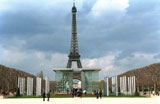 One of France’s
priorities has been to encourage dialogue and regional
co-operation between the new Balkan states that have emerged
from the former Yugoslavian Republic, so as to bring them
closer to Europe.
One of France’s
priorities has been to encourage dialogue and regional
co-operation between the new Balkan states that have emerged
from the former Yugoslavian Republic, so as to bring them
closer to Europe.
France has continued its efforts to promote
association of the Balkan countries to the European
Union.
Two agreements on stabilisation and
association have been signed with the Former Yugoslavian
Republic of Macedonia (ARYM) and Croatia. France is also
urging that the Federal Republic of Yugoslavia be rapidly
included in this process. It has supported the projects of
the Pact of Stability to foster regional co-operation - for
instance those concerning development of infrastructures and
based on State-instituted rule of law (project for a
regional training college for magistrates, anti-corruption
scheme).
France has encouraged the countries of the region to
intensify dialogue and co-operation
-
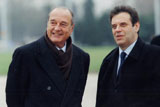 a memorandum of
understanding establishes a free-trade zone amongst the
countries of the region,
a memorandum of
understanding establishes a free-trade zone amongst the
countries of the region,
-
an agenda has been drawn up on regional
action for refugees and displaced persons,
-
an agreement of succession has been
ratified between the five countries that have emerged from
the Federal Republic of Yugoslavia,
-
the gap between Bosnia-Herzegovina,
Croatia and the Federal Republic of Yugoslavia is being
bridged thanks to high level visits and the signature of a
number of bilateral agreements.
Following the 11th September attacks, France has
continued to display its interest in the Balkans
-
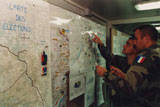 Against the background
of the Macedonian crisis, the visit of the President of
the Republic to Croatia and the Federal Republic of
Yugoslavia, together with those of the French Minister of
Foreign Affairs to Albania, the former Yugoslavian
Republic of Macedonia and Kosovo have confirmed our
commitment to stability in the region: refusal of
violence, precedence of state rule of law, the fight
against terrorism, illicit trafficking and organised
crime.
Against the background
of the Macedonian crisis, the visit of the President of
the Republic to Croatia and the Federal Republic of
Yugoslavia, together with those of the French Minister of
Foreign Affairs to Albania, the former Yugoslavian
Republic of Macedonia and Kosovo have confirmed our
commitment to stability in the region: refusal of
violence, precedence of state rule of law, the fight
against terrorism, illicit trafficking and organised
crime.
-
Together with our fifteen partner
nations, France is striving to ensure that the European
Union play a decisive role in ending the crisis in
Macedonia. In this context, Macedonian leaders signed a
“master agreement” on 13th August forming a consensus
laying the groundwork for thoroughgoing reform.
-
In Kosovo, France has militated in favour
of adopting a constitutional framework for provisional
autonomy in May whilst at the same time keeping watch to
ensure that the November general elections take place
peacefully and democratically. In addition, France is
attempting to facilitate the relations between the United
Nations Mission in Kosovo (UNMIK) and the Yugoslavian
authorities, thanks to the signature of a joint
document.
Supporting Russia’s pro-European
orientation
An intense, high level political dialogue
The official visit to Russia by the
President of the Republic in July 2001, the 7th governmental
seminar in Moscow in October and about twenty visits by
ministers to Russia and France have enriched the dialogue
and intensified the co-operation between our two countries
in a host of fields.
France encourages Russia’s pro-European
orientation
The European orientation of President
Poutine, who considers that the future of an up-to-date,
democratic Russia cannot be conceived without close
relations with the European Union, together with his choice
in favour of the anti-terrorist coalition, has induced
France to foster development of partnership between the
Union and Russia.
The advances achieved under the French
Presidency of the Union during the second half of 2000 were
confirmed at the 8th EU/Russia summit meeting (Brussels,
October the 3rd 2001) dealing with strengthened co-operation
on political and security issues in Europe, including the
prospect of Russia participating in crises management
operations conducted by the European Union.
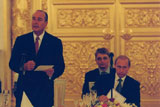 During the European
Council Meeting at Laeken in December 2001, the President of
the Republic called on the European Union and on France’s
partners to develop co-operation with Russia in such issues
as of the fight against organised crime, drug trafficking,
terrorism and clandestine immigration. The President
suggested that an entity be created to enable the relevant
European ministers to discuss these matters with their
Russian counterparts, and this entity met for the first time
during the Spanish Presidency.
During the European
Council Meeting at Laeken in December 2001, the President of
the Republic called on the European Union and on France’s
partners to develop co-operation with Russia in such issues
as of the fight against organised crime, drug trafficking,
terrorism and clandestine immigration. The President
suggested that an entity be created to enable the relevant
European ministers to discuss these matters with their
Russian counterparts, and this entity met for the first time
during the Spanish Presidency.
The dialogue on questions of energy between
the European Union and Russia set in motion under French
Presidency enabled specific priorities to be pinpointed. A
structure for implementing them was created in Brussels in
October with the task in particular of assisting investors,
promoting energy-saving pilot projects, implementing the
mechanism of flexibility of the Kyoto protocol, and
improving the Russian legal framework and regional
surveillance of the network of pipelines, and especially
surveillance by satellite.
France has encouraged development of the
future “Common European Economic Space”, the intention of
which is to create a free-trade zone of continental scope. A
working party has been appointed to study provisions for
economic integration and harmonisation of the legislative
systems of the European Union and Russia.
France in support of the policies for reform in
Russia
France has continued to develop its
co-operation with Russia, which has benefited from the first
budget allocation of funds for Central and Eastern Europe in
matters of cultural relations, amounting to over 8.5 million
euros a year.
-
An agreement was signed on May the 25th 2001 to create
a working party on administrative co-operation.
-
The appointment of a magistrate to the French Embassy
in Moscow to step up our bilateral co-operation - Russia
is undergoing a sweeping reform of justice - has been
announced. A co-operation protocol was signed in December
between the two Ministries of Justice.
-
France and Russia have advanced in their negotiations
on a draft agreement for internal security that is to
govern about twelve areas of co-operation between our two
countries, in particular the fight against organised
crime, narcotics trafficking, clandestine immigration and
terrorism. This agreement is scheduled to be signed in
2002.
Acting in favour of peace in the
Near-East and Middle-East
The deterioration of the situation between
the Israelis and the Palestinians has been the foremost
concern of France in the Middle-East.
Israel and Palestine
 Since the change of
government in Israel (February 2001), France has
unremittingly urged the Israelis and the Palestinians to
return to a political process to resolve the crisis and
restore the prospects for the peace process. It has marked
its attachment to the results of the Taba meeting, outlining
the just and lasting peace to which the Middle-East peoples
aspire.
Since the change of
government in Israel (February 2001), France has
unremittingly urged the Israelis and the Palestinians to
return to a political process to resolve the crisis and
restore the prospects for the peace process. It has marked
its attachment to the results of the Taba meeting, outlining
the just and lasting peace to which the Middle-East peoples
aspire.
In the face of the deadlock created by
violence and the absence of political dialogue, France has
attempted to bring each side to see that no solution is to
be achieved by resorting to force. Such is the message that
it has tirelessly repeated to each of the adversaries, in
particular during the state visit of the Israeli Prime
Minister Mr. Sharon to Paris in July and the visit by the
French Minister of Foreign Affairs to the region, in the
context created by the 11th September attack. Our country
has agreed with its European partners to conduct a
particularly active policy of presence and dialogue in the
region. The President of the Republic has expressed his wish
that the international community work alongside the parties
involved to bring them back to the negotiating table.
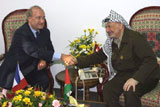 In this spirit, we have
supported the work of the fact-finding commission (the
Mitchell Commission) created at the Charm-el-Cheikh summit
(October 2000), to which Mr. Solana, the Senior
Representative of the European Union for Foreign Policy and
Common Security participated. We have acknowledged the
quality of the Commission’s report, released in May 2001,
and declared our support together with our Union partners in
applying the recommendations proposed.
In this spirit, we have
supported the work of the fact-finding commission (the
Mitchell Commission) created at the Charm-el-Cheikh summit
(October 2000), to which Mr. Solana, the Senior
Representative of the European Union for Foreign Policy and
Common Security participated. We have acknowledged the
quality of the Commission’s report, released in May 2001,
and declared our support together with our Union partners in
applying the recommendations proposed.
France has played an active part in
reflecting on a means of observation aimed at restoring
confidence between the parties and facilitating
implementation of the Mitchell Commission recommendations.
The European Union has stated that it is available to
participate in this implementation.
 It has contributed to
the work of the European Council Meeting at Laeken in
December which, amongst other things, recalled that to build
peace, Israel needs the Palestinian Authority and its
elected President, Yasser Arafat.
It has contributed to
the work of the European Council Meeting at Laeken in
December which, amongst other things, recalled that to build
peace, Israel needs the Palestinian Authority and its
elected President, Yasser Arafat.
A constant dialogue has been kept up with
the United States on the Near-East issue. Amongst other
things, France finds highly satisfactory the sharing of its
views with the objectives stated by President Bush at the
United Nations and by the American Secretary of State in his
speech at Louisville calling for the coexistence of two
states - Israel and Palestine - living side by side in
security and dignity. We have marked our support for
American efforts in working to seek out a solution.
Syria and Lebanon
Throughout the year, in the framework of
its dialogue with all the protagonists, France has
unceasingly striven to convince them to maintain a
responsible attitude. In particular, during the state visits
of the Lebanese and Syrian presidents in May and June,
France has attempted to convince them of the dangers of
escalation in the region. This message of restraint was
repeated to the parties in the international context created
as a result of the events of 11th September.
The Middle-East in the face of evolving political
relations in the region
France has stepped up its contacts with the
Gulf States following the 11th September events and has
continued to take into account:
-
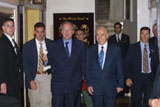 The specific nature of
the situation in Saudi Arabia which, just like most of its
neighbours in the peninsula, is subject to domestic and
external pressures.
The specific nature of
the situation in Saudi Arabia which, just like most of its
neighbours in the peninsula, is subject to domestic and
external pressures.
-
The new and increasing role of Iran, as a
result of the events in Afghanistan. Here, we have closely
followed the evolution of the situation in this country,
allowing in particular for its role in the Afghan
issue.
-
The developments of the Iraqi issue, with
the adoption of UN resolution 1382, opening new prospects
for this country. We have strongly urged Iraq to grasp the
opportunity offered by this resolution to break away from
the current status quo.
In December, the President of the Republic
visited Saudi Arabia - following the October visit by the
Minister of Foreign Affairs - and the United Arab Emirates.
The Delegate Minister for Co-operation and the
French-Speaking world likewise visited Yemen and Iran in
November. The main substance of all these visits was to
express our confidence in the states of the region and our
wish for systematic co-operation in the struggle against
international terrorism.
Favouring dialogue with the cultures of
the Maghreb countries
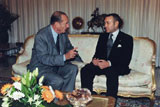 The 11th September
terrorist attacks have led France to proliferate its
contacts with the Maghreb countries, with each of which it
has always had close ties. Many French personalities visited
Algeria, Morocco and Tunisia in Autumn 2001.
The 11th September
terrorist attacks have led France to proliferate its
contacts with the Maghreb countries, with each of which it
has always had close ties. Many French personalities visited
Algeria, Morocco and Tunisia in Autumn 2001.
-
The dialogue between cultures lay at the
heart of the visits made to countries of the region. The
Mediterranean Forum held on 25th and 26th October at
Agadir worked on this subject which at our initiative is
to form the subject of an exceptional Forum to take place
in the first six months of 2002, bringing together
ministers and intellectuals from the Mediterranean
countries.
-
The visit of the French President to
Algeria, Morocco and Tunisia in December and that of the
Minister of Foreign Affairs to these countries in October
are a confirmation of our interest in this region. They
bear witness to our wish to avoid a clash of civilisations
by taking into consideration the concerns of the public
opinions of these Maghreb countries. France has taken the
opportunity to restate to our partners the attention the
French authorities pay to the situation of the Magreb
communities in France.
-
The visit to Libya in October by the
Delegate Minister for Co-operation and the French-Speaking
world has consolidated the increasingly close relations
that prevail with this country.
-
Various events bear witness to the
vitality of the relations between France and the Maghreb
countries in 2001:
-
the Franco-Moroccan meeting between
heads of governments in Paris in May,
-
the visit by the Delegate Minister for
Co-operation and the French-Speaking world to Tunisia in
May and the Minister of the Interior in October,
-
the signature on 11th July of a new
addendum to the Franco-Algerian agreement of December
the 27th 1968 concerning the conditions of entry and
stay of Algerian citizens on French territory,
-
the meetings on decentralised
co-operation between French and Moroccan politicians
elected to office at Fez (Morocco) in November,
-
preparation for the Algerian Season,
scheduled to start in autumn 2002.
Supporting the process for resolving
crises in Africa
In 2001, France proved particularly
active in the United Nations with regard to African
issues.
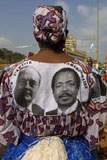 In particular, it has
sought to guarantee the involvement of the international
community in the crises that occurred in the Democratic
Republic of Congo, Burundi and the Central African
Republic:
In particular, it has
sought to guarantee the involvement of the international
community in the crises that occurred in the Democratic
Republic of Congo, Burundi and the Central African
Republic:
-
It was at France’s initiative that resolutions 1341
(February) and 1376 (November 2001) concerning the
Democratic Republic of Congo were adopted. Through them,
the Security Council has backed resumption of the peace
process in the Congo conflict by launching the second and
then the third deployment phase of the United Nations
observation mission (MONUC). The strength of this
peacekeeping operation should attain 5000 “blue helmets”
and 650 observers by the summer of 2002.
-
In the Central African Republic, following the
attempted coup d’état of the army on May the 29th 2001,
France solicited the UN Secretary General to appoint very
quickly a new in-situ representative. The nomination of
Mr. Cissé, former Senegalese Minister of the Interior, and
the declaration of the Chairman of the Security Council of
July the 17th 2001, prepared by our country, have enabled
the United Nations officials and institutions in the
Central African Republic to resume their
activities.
In Africa, our country has helped to relieve
tensions
-
In Ethiopia / Eritrea, a French contingent of almost
200 has participated in the United Nations peacekeeping
force (MINUEE) deployed along their common frontier, from
June to December 2001. By joining this new “blue helmet”
operation, France has reaffirmed its commitment to serve
peace in Africa and its firm resolve to fulfil the special
responsibilities incumbent on it as permanent member of
the Security Council.
-
In its visit in August to the Great Lakes region:
Uganda, Rwanda, Congo and to the Democratic Republic of
Congo, the French Minister of Foreign Affairs reasserted
our concern that all the parties to the conflict fully and
faithfully apply the Lusaka agreement and the relevant
resolutions of the Security Council.
-
In Sudan, the visit in October of the Delegate Minister
for Co-operation and French-Speaking world demonstrated
France’s will to support the opening-up of the Khartoum
regime and efforts towards peace of the Intergovernmental
Authority for Development (IGAD), at a time when the more
intensive involvement of the United States in the Sudanese
conflict justifies the hope of giving new impetus to the
peace process.
-
In the Comores, France, who refused to intervene in the
crisis provoked by the separatists intentions of Anjouan,
supported the action of the Organisation for African Unity
(OAU) and provided financial assistance for implementing
the Fomboni agreement, and in particular for organising
the constitutional referendum of December the 23rd, and
collection of arms by the OAU.
